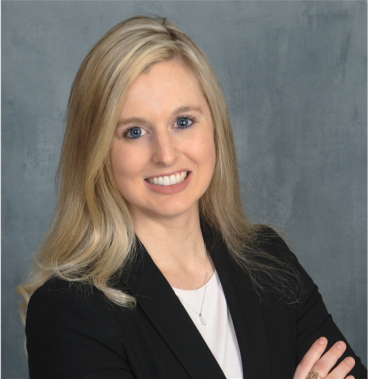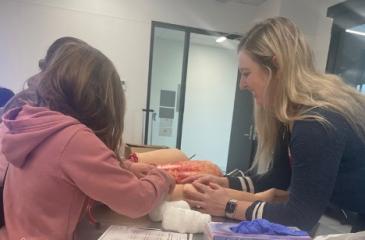M Simulation at the University of Minnesota was the first simulation center in the United States to offer the American College of Surgeons surgical simulation fellowship. The goal of the fellowship program, now more than 15 years old, is to provide a foundation for creating leaders in the development, evaluation, and delivery of surgical education curricula enhanced through the use of simulation technologies.

Lauren Weaver, MD, a fourth-year general surgery resident, is M Simulation’s newest surgical simulation fellow. Originally from Ohio, Weaver moved to Minnesota for her residency; the University of Minnesota was her first choice.
“In less than a year, I feel like I've evolved a lot as a teacher and I'm excited to see surgical education as part of my future career path; it’s such an exciting field to be in now because it's going through a revolution of sorts. I hope to be a part of building a more holistic surgical training curriculum for learners,” said Weaver.
A Brief History
In 2007, the program known as SimPORTAL (Simulation PeriOperative Resource for Training and Learning), now a part of M Simulation, became a Level 1 Comprehensive Education Institute. By achieving this accreditation through the American College of Surgeons, M Simulation was able to secure funding and developed a series of one-year surgical simulation fellowships with a comprehensive curriculum to train leaders to be facile in the emerging field of simulation science. In addition to research, the fellow is also involved in teaching simulation classes for medical students and residents, as well as in the design and implementation of all surgical simulation activities that occur within M Simulation.
Once the fellowship was completed, the surgical simulation fellow would be knowledgeable about simulation education theory, competent in its practice, and interested in further developing their own technical skills through an array of simulation activities. Additionally, they gain hands-on technical skills and research experience.
A Rising Star
Weaver began her fellowship in July 2023 and is wrapping up her first year. Her interests include colorectal surgery and surgical education. She is particularly interested in developing non-technical skills curricula, (e.g., clinical communication skills training) for surgical residents, qualitative research and analysis, dealing with burnout and resilience, and working with simulated patients (SPs). Her current project involves de-escalation techniques with patients, utilizing SP methodology, which she recognizes are just as important as learning technical skills. With the mentorship of Lou Clark, PhD, executive director of M Simulation who also serves as the M Simulation American College of Surgeons educational institute director and current president of the Association of SP Educators, Weaver has developed an SP-based simulation curriculum that she hopes will be incorporated into future curriculum for residents. Weaver is currently working to publish her manuscript which details the simulation methodology used to undertake this project with Clark.
The de-escalation simulation is geared toward junior-level residents who are often on call and meet with patients, particularly in trauma or high stress situations. Patients might be frustrated or angry about their hospital experience.
“When I was in that position, I realized I didn’t have the skills to make patient communication interaction successful. You often just learn on the job which has its drawbacks,” said Weaver. “Being in a safe, comfortable place to practice these skills in order to improve patient outcomes and communication is crucial.”
Weaver developed just in time training of de-escalation skills, which includes an orientation reviewing best practices. The resident is then tasked with taking what they’ve learned with a standardized patient (SP) with a postoperative complication and is frustrated with their possible course. The simulation is followed by a debrief where residents have the opportunity to get feedback and go over what they think went well and what they would do differently next time. They then partake in a second scenario with an even more escalated SP where they can use the feedback to improve.
“What I've learned in this fellowship is that there is so much more that goes into coming up with these scenarios and working with the SPs. As a resident, you're in charge of giving feedback to medical students, and it’s certainly changed the way I structure my feedback altogether. I learned so much about what giving good feedback really means and that's certainly something I will take with me as I go back into residency,” said Weaver.
After observing M Simulation leadership conduct a workshop, Weaver will help lead a train-the-trainer workshop for health care professionals in simulation methodology.
“The fellow has regular dialogue with myself and other members of the M simulation leadership team as part of their training,” said Clark. ”It's these learning opportunities paired with the chance to take on a leadership role where you get to practice while getting feedback that we fulfill the mission of educating the surgeons of tomorrow and provide continuing education for practicing surgeons.”
Through the fellowship, Weaver has gained a wealth of teaching experience, including teaching surgical skills to high school students, undergraduates, medical students, and residents. She is also part of a journal club with the M Simulation team that meets every month.
Mojca Remskar, MD, PhD, MACM, medical director for M Simulation and part of the steering committee for the fellowship, said, “Dr. Weaver is by far the most well rounded fellow we have ever had. I sincerely believe she has the capacity to change surgical education.”
“It has been very rewarding to see Dr. Weaver develop skills in education and education theory. She has become an excellent education researcher as well, presenting at the most prestigious surgical education conferences. She is already known on the national level in surgical education. I expect great things in her future,” added Melissa Brunsvold, MD, FACS FCCM, surgical director for the American College of Surgeons (ACS) Surgical Simulation Fellowship.
Typically, the surgical fellowship takes place over the course of a year—wanting to extend the opportunity for fellows to deepen their experience, it has been changed to two years.
“I’m looking forward to my second year of the fellowship. I want to hone in on best practices, how to evaluate and create simulation and curricula from technical simulation, and use a mix of technology-based and human simulation,” said Weaver. “My favorite part of this experience is teaching learners and seeing that light turn on—when their eyes get wide because they just figured something out, their excitement really energizes me as an educator.”



